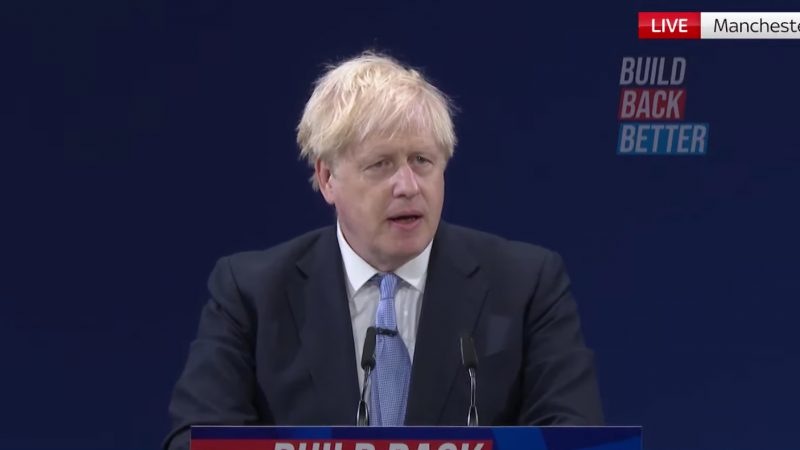
Boris Johnson has been criticised by commentators after delivering a speech with a lack of policy that right-wing think tank Adam Smith Institute has described as “bombastic but vacuous and economically illiterate”.
In a policy-light keynote address to the Conservative Party conference today, taking place in Manchester, the Prime Minister told Tory members that “levelling up is the greatest project that any government can embark on”.
Johnson said his leadership would “deal with the underlying issues of our economy and our society” and promised to “build back better”. He accused the Labour Party of wanting to “level down” rather than up.
He described his administration as a “reforming” and “can-do government”, focused on tackling long-term structural weaknesses in the economy. He blamed sectors such as haulage for not properly investing in better wages and conditions.
The only policy announced by Johnson today was a recycled “levelling up premium”, which will see “talented maths, physics and chemistry teachers” receive £3,000 more per year to encourage them to work in more deprived areas of the country.
Critics have highlighted the lack of policy announced in the speech. TSSA general secretary Manuel Cortes branded it “hollow” and argued that “as ever this political jester came up with nothing but hot air”.
“We had slogans over specifics at a time when costs are rising, inflation is a real worry, Universal Credit is reduced for millions, there are widespread food and fuel shortages and a very real climate crisis,” Cortes said.
Unite the Union’s Sharon Graham said the speech was “nothing more than headline chasing” and the Prime Minister was “desperate to deflect from the serious and growing cost of living crisis happening on his watch”.
The new Unite general secretary urged him to establish sector bargaining to “put a solid floor underneath workers’ earnings and stop the never-ending race to the bottom” if he “genuinely wants to reverse the years of insecurity and falling wages”.
Referring to the pay freeze for most public sector workers, TUC general secretary Frances O’Grady said Johnson is “in no position to lecture people on wages when he is holding down the pay of millions of key workers in the public sector”.
“As the country’s biggest employer, the government should be setting an example on paying staff properly – not skimping on wages. My advice to the Prime Minister is simple: the best way to level up pay and conditions across the country is to give workers and their unions more bargaining power at work,” she said.
IPPR executive director Carys Roberts argued that while the Prime Minister had promised change in his speech, the cut to Universal Credit taking effect today demonstrates that “we are seeing more of the same”.
Ministers are cutting the £20-per-week uplift to the benefit introduced last year during the first wave of the pandemic. The standard allowance for a single person aged under 25 falls back from £79 a week to £59, a drop of 25%.
“To truly turn our back on the UK’s broken economic model, the Prime Minister should have announced a transformative economic agenda. Reaching net zero and levelling up are vital missions that the UK can use as central pillars of this, but on both we are still left waiting for crucial policy detail,” Roberts added.
Despite only announcing one policy during the 45-minute speech, on education, Johnson told the Conservative Party conference this afternoon that the government is “taking the tough decisions” on meeting the climate net-zero target.
He described Keir Starmer as “looking like a seriously rattled bus conductor, pushed this way and that by a Corbynista mob” and accused the Labour Party of having spent the pandemic “flapping with the conviction of a damp tea towel”.
Joseph Rowntree Foundation deputy director of policy and partnerships Katie Schmuecker said Johnson’s “attempt to strike an upbeat tone is completely at odds with the despair people are feeling and the cost-of-living crisis we are now facing”.
The Prime Minister told his party colleagues that the Conservative government will unleash the potential of all Britons, citing as examples sports stars such as the England football team, Olympians and Paralympians.
“Not only the achievement of those elite athletes but a country that is proud to be a trailblazer, to judge people not by where they come from but by their spirit, by what is inside them,” he said.
“That is the spirit that is the same across this country, in every town and village and city, that can be found in the hearts and minds of kids growing up everywhere and that is the spirit we are going to unleash.”
Johnson defended the planned rise in National Insurance intended to pay for extra NHS treatments and social care, telling those watching that Margaret Thatcher would have raised taxes after the “meteorite” of the pandemic.
He praised the private sector and bankers, crediting them with delivery of the AstraZeneca jab, saying: “Behind those vaccines are companies and shareholders and, yes, bankers. You need the deep pools of liquidity that are to be found in the City of London… It was capitalism that ensured we had the vaccine investment.”
Anneliese Dodds said: “Boris Johnson’s vacuous speech summed up this whole Conservative conference. The Prime Minister talked more about beavers than he did about action to tackle the multiple crises facing working people up and down the country.
“Far from getting a grip on the spiralling costs of energy, fuel and food, the Tories are actively making things worse – cutting incomes today for six million families by over £1,000 a year.
“Britain deserves a fairer, greener and more secure future. Last week Labour set out how we can get there. This week it’s clear that after over a decade in power the Conservatives don’t have a clue.”




More from LabourList
‘AI regulation is key to Labour’s climate credibility’
Ben Cooper column: ‘Labour needs to rediscover its own authentic populism’
‘Westminster rethought: a new purpose built site and a museum of democracy’